
Putin’s court has issued a verdict against Deutsche Bank, demanding the payment of damages to Gazprom, a Russian energy giant, due to their involvement in a contract relating to the construction of a gas processing plant in Russia. The court ruled that the Deutsche Bank must make a partial payment of a €239 million compensation claim to Gazprom. The total claim amount and further details have not been disclosed as yet. Despite the ruling, Deutsche Bank stated that the judgment is neither enforceable nor final, and they are awaiting the complete court decision to evaluate their next steps.
This legal action against Deutsche Bank is part of a series of sanctions imposed by Russia against Western financial institutions regarding a terminated gas terminal project due to Western sanctions. Prior to this verdict, a St. Petersburg arbitration court had frozen the assets of several banks, including Deutsche Bank and Commerzbank, involved in the gas terminal project. The freezing of assets was at the request of RusChimAllianz, a Gazprom subsidiary responsible for an LNG terminal project in the Baltic Sea, which filed claims against Deutsche Bank amounting to €238.61 million and against Commerzbank to the tune of €94.92 million. The frozen assets include securities, real estate, and funds held in accounts belonging to Deutsche Bank, Commerzbank, and other affiliated entities.
In response to the escalating tensions and risks faced by Western banks in doing business in Russia amidst the geopolitical situation, financial institutions like Deutsche Bank and Commerzbank are contemplating worst-case scenarios, including potential insolvency of their Russian subsidiaries. Both banks have ceased new business activities in Russia since the beginning of the conflict involving Ukraine and have reduced their overall exposure in the region. Despite these measures, challenges remain for these banks due to restrictions imposed by Western sanctions, limiting their options to sell assets in Russia effectively. This situation also entails the risk of the Kremlin exploiting the circumstances to acquire these assets at undervalued prices, as suggested by experts analyzing the scenario.
Gießen News Telegram-KanalHessen News Telegram-KanalUrsprünglich wurde es in den 1950er Jahren aus einer Boje entwickelt! Seither ist es ein fester Bestandteil jeder Gartenparty und das Herzstück jeder geselligen Runde im Freien.
Lösung anzeigen
